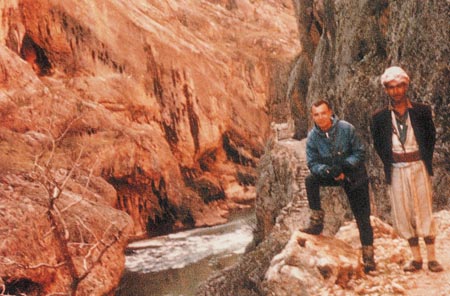|
|
Biography
|
 © Lovat, Sur la route de Barzan, Kurdistan-Février 1963
François-Xavier LOVAT was born in December, 1940, in Casablanca,
Morocco, then under French Protectorate.
From a French family who settled in North Africa as soon as 1832.
After Secundary school in Casablanca, he enters the National School of Engineering of Strasbourg in 1959.
First hitch-hiking travel to India in summer 1960. Meeting with the Kurds in Iran.
He decides to become a reporter, to expose the drama of the Kurdish people, absolutly unknown then.
National School of Photo-Cinema in Paris. He gest his diploma in October 1962.
He joins the Kurds of Iraq at war in December 1962. Over 5 months, he makes a 23 minutes TV report,
and shoots more than a thousand still-pictures.
After his military duty (during which he receives the Price of the Fondation of Vocation),
he is hired by NBC News as a chief-reporter in February 1965. Based in Paris,
he covers all the main events in Western Europe, Mediterranea, Africa, Middle East, until the end of 1969.
Two Emy Awards. More than twenty Specials of one hour. Middle East. H Bombs in Palomares.
6 Days War. Invasion of Tchechoslovakia. War of Biafra (twice 3 months).
In 1970, creates his own TV Production company, and starts working for foreign TV Channels.
Five months of war in Viet-Nam and Laos. Earthquake in Nicaragua. Draught in Sahel.
E.T.A. in Spain. Invasion of Cyprus. Front Polisario (5 times). The Fall of Pnom Penh.
Lebanon, from 1975 to 1988. Iran-Iraq War, from both sides. War in Uganda.
Between 1963 and 1996, covers almost 2500 reports. More than 50 documentaries.
(French speaking people in the world. The Travel of Marco Polo, 10 times 30 minutes.
Afghanistan. Discovery of the North-West Passage by Roald Amundsen. First Embassy of
Claviro in Samarkand, 1404. The Inuits of the North Greenland. Ku-Klux-Klan in USA.
Coup in Aden. The Unita of Savimbi in Angola).
First foreigner to get the Great Price of the Japonese TV.
In 1996, he travels to Iraqi Kurdistan. He decides then to
publish a collection of books to illustrate the Kurdish Collective Memory.
|
|